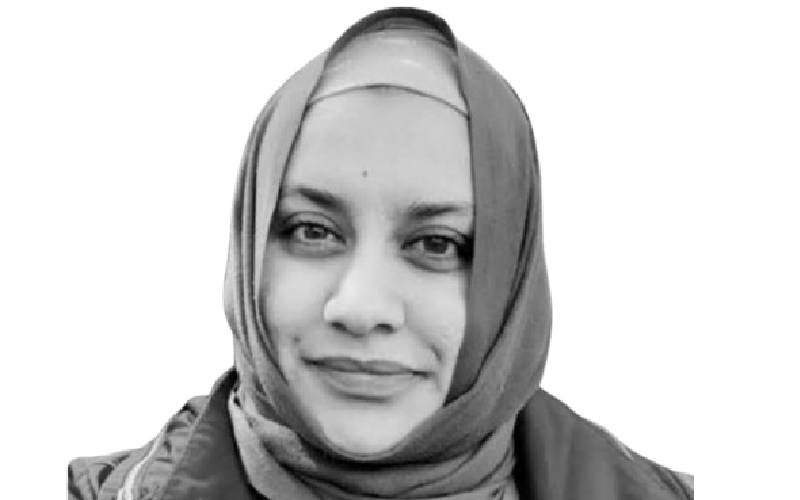Murang'a High School Principal Mr Willie Kuria who chairs secondary school heads wearing a white red ribbon to mourn the Murang'a secondary school head association vice secretary Solomon Mwangi.[BONIFACE GIKANDI.]

Murang'a High School Principal Mr Willie Kuria who chairs secondary school heads wearing a white red ribbon to mourn the Murang'a secondary school head association vice secretary Solomon Mwangi.[BONIFACE GIKANDI.]
When Brian Mutua, a form three student fell ill during morning preps, his teachers faced a dilemma.
With no school medical fund to rely on since the scrapping of the Edu Afya programme, one of the teachers had to call his parents to take him to a hospital. Unfortunately, his mother, a casual laborer, could not afford immediate medical care.
Like many other students, Mutua had no option but to endure his sickness until he lost his life.
“I felt helpless. My son needed treatment, but I had no money to take him to hospital. I lost him while struggling to find ways of collecting funds from friends to admit him,” said Margaret Mutheu, Mutua’s mother.
Mutua’s case is just one of many across the country following the government’s decision to discontinue Edu Afya in 2023, a medical scheme that had been providing essential healthcare services to students since 2018.
The termination of the programme has put a significant financial burden on parents, many of whom already struggle to make ends meet.
Under Edu Afya, secondary school students were covered for medical expenses through the National Health Insurance Fund (NHIF).
This initiative ensured that students could receive treatment for common ailments, injuries, and even chronic illnesses without financial constraints.
However, its cancellation in 2023 left thousands of learners vulnerable, forcing parents to dig deeper into their pockets to cater for medical emergencies.
According to Willie Kuria, chairman, Kenya Secondary Schools Heads Association (KESSHA), the burden of facilitating medical care has fallen back on teachers and parents.
“It’s heartbreaking to see students suffer because they lack medical attention. Teachers have on many occasions paid for learners’ medication since we cannot keep sick students in school,” said Kuria.
Benson Manoo, Machakos school principal says before medical cover was abolished, there was no cause of worry whenever students fell ill or got injured.
Faced with many obligations, many parents keep praying and hoping that their children do not fall sick. National Parents Association chairman Silas Obuhatsa say a majority of parents have no money for medical bills.
Stay informed. Subscribe to our newsletter
“Our parents are struggling to even take care of their medical cover, it even gets worse for a parent who has like five children in school," said Obuhatsa.
A principal in Nairobi said the situation could not be that bad had disbursement of capitation been adequate and timely.
Another principal in Nairobi blamed this to delayed capitation and government silence on the issues affecting learners.
“Sometime you blame school administrators when students die in school yet the challenges we face are overwhelming," he said.
As a result, some schools have resorted to levying money for medical care and Martin Oloo, a parent in Kisumu is not happy about the extra financial burden.
“We are charged extra Sh1,000 every year for learners’ medical cover. Government has failed to offer its services to learners, and instead blames schools for charging illegal levies. What do you expect schools to do?” he stated.
John Ole Too, a concerned parent from Kajiado is of the view that if the government can not reinstate Edu Afya, then it should provide an alternative that will ease suffering among students and parents.
Even as parents complain, Basic Education Principal Secretary Belio Kipsang last year directed all learners to register for Social Health Insurance Fund (SHIF).
“All school-going children are, therefore, required to register as dependents of their parents before school opening dates for the third term of 2024,” said Dr Kipsang.
However, several parents opposed the move, saying it is a way of forcing them to register for the new medical scheme.
Catherine Jepkosgei in Nandi County feels the government should instead revert to the old medical scheme.
“The government is pushing this thing in our throat by force. I am not aware what is entailed in the new cover since the stakeholders were not involved,” she lamented.
Besides the healthcare crisis, many schools are also shelving co-curricular activities due to funding shortages.
Music, drama, and sports are often viewed as secondary to academics as institutions struggle to allocate their meager resources.
Kuria reiterated that financial strain has forced schools to compromise on critical areas such as extracurricular activities and practical lessons.
“The first area on our chopping block is co-curricular activities. We cannot fund or prepare students to participate in activities when suppliers of learning materials are camping in school compounds,” said Kuria.
These activities are key avenues for nurturing talent and personal growth.
“These activities are not distractions; they complement academic learning by enhancing critical thinking, teamwork, and leadership skills,” says Dr Peter Ochieng, an education specialist.
He argues that excluding students from co-curricular activities does more harm than good.
“A student who plays in a football team learns discipline and resilience, just as a drama club member improves their communication skills; both of which are essential in their academic and future career success,” notes Dr Ochieng.
Njeri Mugo, a high school teacher says, beyond academic benefits, co-curricular activities shape students’ character and social skills.
“Not every lesson is learned from a textbook. Some of the most important life lessons come from interactions outside the classroom,” says Mugo, adding that students who miss out on these activities often struggle with socialization and self-expression.
“Denying students these opportunities not only affect their confidence and social skills but also limits their ability to excel in the competitive world beyond school,” she added.
According to Dr Albert Masiolo, Principal of Vihiga High School said co-curriculum activities help learners discover their career pathways.
“These activities are not just for fun; they help students develop leadership, teamwork, and confidence. Here is where our learners are going to identify their pathways,” stated Masiolo.
According to Dr Emmanuel Manyasa, Usawa Agenda Executive Officer, co-curricular activities play a crucial role in a child’s holistic development, positively impacting their academic performance and social skills.
“A well-rounded student is not just one who scores highly in exams, but one who can lead, adapt, and communicate effectively. Co-curricular activities are the bridge to that balance,” he noted.







